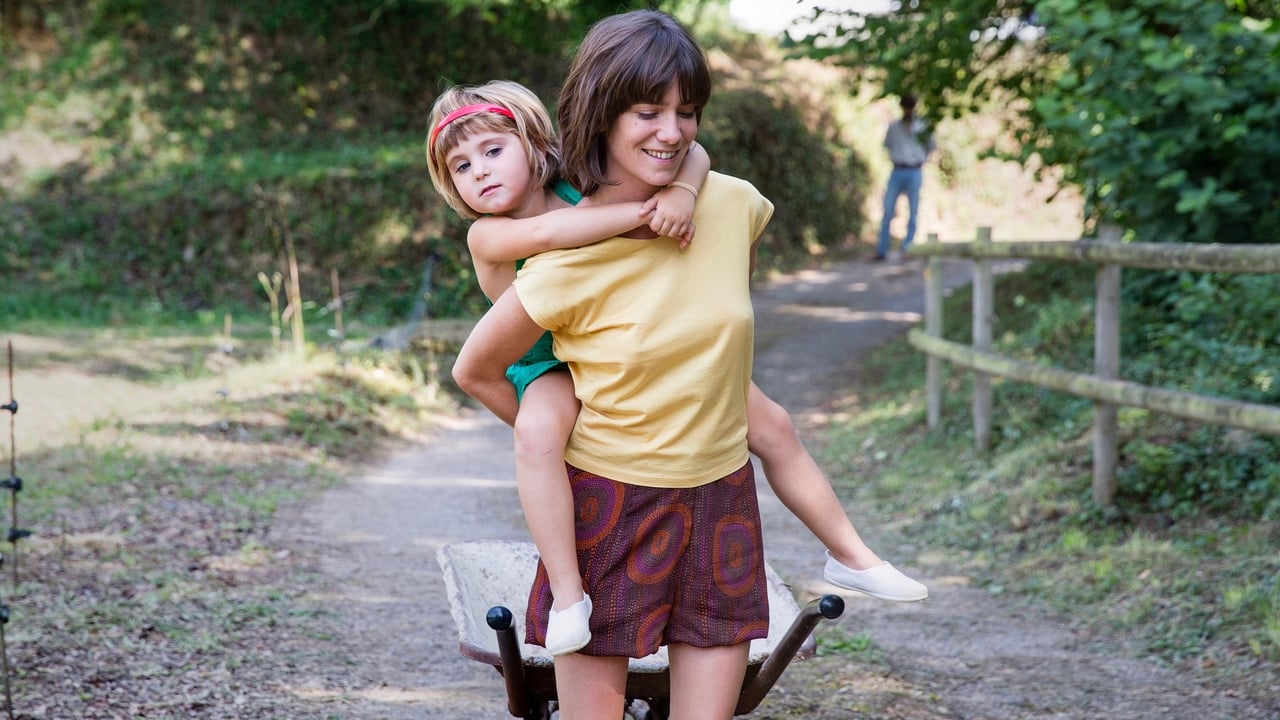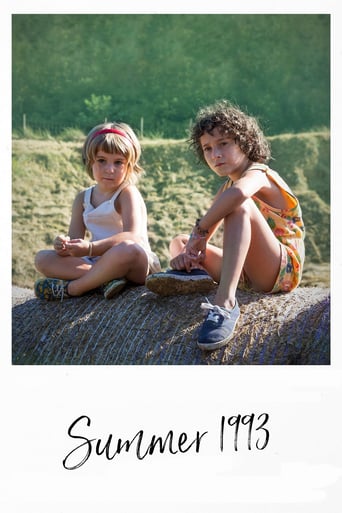

just watch it!
... View MoreHow sad is this?
... View MoreI wanted to like it more than I actually did... But much of the humor totally escaped me and I walked out only mildly impressed.
... View MoreThis is a coming of age storyline that you've seen in one form or another for decades. It takes a truly unique voice to make yet another one worth watching.
... View MoreSummer 1993" (2017 release from Catalonia; 97 min.) brings the story of Frida, a 6 or 7 yr. old girl. As the movie opens, we see Frida's stuff being boxed up, and Frida along with a couple driving out of the city. The couple discuss the situation in hushed terms but we pick up quickly that Frida's mom just passed away (we're not quite sure of what), and that Frida is now taken care of by her mom's brother Esteve and his wife Marga. The couple have a daughter of their own, 3 or 4 yr. old Anna. How will Frida adopt to her new environment? more importantly, how will the little girl process the death of her mom? At this point we're 10 min. into the mvie, but to tell you more of the plot would spoil your viewing experience, you'll just have to see for yourself how it all plays out.Couple of comments: this movie is written and directed by Carla Simon, based on her memoirs and with Frida standing in for Carla. Set in rural Catalonia, we observe how Frida tries to settle into this new family, while at the same time dealing with her overwhelming sense of loss and sadness. Not surprisingly, Frida is at times scared, confused, angry, or withdrawn (and at times all of those at once). There seemingly is no "plot" to speak of, but that is in fact not the case at all. It's just that the "plot" reveals itself with subtlety. Of course none of this would have been possible but for the astonishing performance of the little girl who plays Frida, wow, just wow Not enough can be said about that. The director smartly gives us a lot of interaction between Frida and Anna, with at times uninterrupted shots that seemingly go forever (in reality: a minute or two). The closing scene of the movie is both brilliant and heartbreaking. (Afterwards, the movie shows it is dedicated to the memory of Carla Simon's mother.)"Summer 1993" premiered at the 2017 Berlin film festival, to immediate acclaim. I have no idea why it's taken 18 months for the movie to reach US theaters. The movie opened this weekend at my local art-house theater here in Cincinnati, and I couldn't wait to see it. The Saturday matinee screening where I saw this at was attended nicely (but nowhere close to sold out). If you like a top notch foreign movie that examines how a young girl copes with her mom's death, I readily recommend you seek this out, be it in the theater, on VOD, or eventually on DVD/Blu-ray, and draw your own conclusion.
... View MoreCarla Simon's well-observed tale of a young girl who's orphaned and forced to move into her uncle's home. Frida (Laia Artigas ) is the girl and her uncle Esteve (David Verdaguer) has a wife Marga (Bruna Cusi) and an even younger daughter Anna (Paula Robles). Frida's mother's passing of an "illness" isn't defined at the outset, but, the constant medical tests the young girl has to be subjected to and the panic that ensues when she bleeds on a playground give you a pretty good idea of what will be revealed (not to mention setting it 25 years ago). But, SUMMER 1993 isn't really about that topic, it's more about coping without parents, and trying to blend in with her uncle's family. It's often awkward, and even painful, but it's never less than perceptive even if it never quite reaches the next level. The movie's path never seems in doubt, no matter the obstacles put in the characters' way. The music selections are interesting and unexpected with touches of soulful jazz. The ending concludes on a different note than one might forsee - but, it's just about right. This was Spain's official submission for the Foreign Language Oscar last year (it was not nominated or short-listed).
... View MoreOne of the most boring films i have ever seen... typical spanish movie.
... View MoreThis is the story of a little girl from Barcelona who is adopted by her aunt's family in the countryside, after her mother passes away. Largely autobiographical, "Summer 1993" is filmed in a very naturalistic style and almost feels like a documentary. The director, Carla Simón, pays special attention to the kind of small details that can make a big difference to a young kid. Although not very much seems to be going on in the surface, one can see that a very important drama, charged with intense emotions, is going on deep in the lives of this little person and the family that has welcomed her. The acting is all very effective and particularly Laia Artigas, who plays the main character, is surprisingly strong and charismatic for someone her age. "Summer 1993" is one of many Spanish films that observe the world through the eyes of a child. Other examples include the classics "Cría Cuervos", "The Spirit of the Beehive" and "El Sur" or even the more recent "Pan's Labyrinth". The contemplative gaze and relatively slow pace remind me of "En Construcción", a documentary by another Catalan filmmaker, José Luis Guerín.
... View More